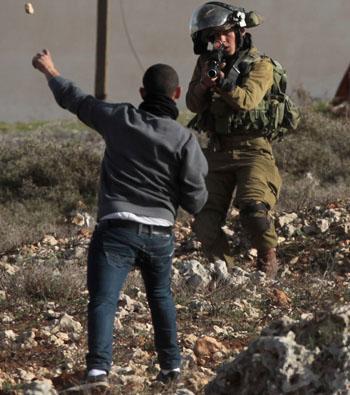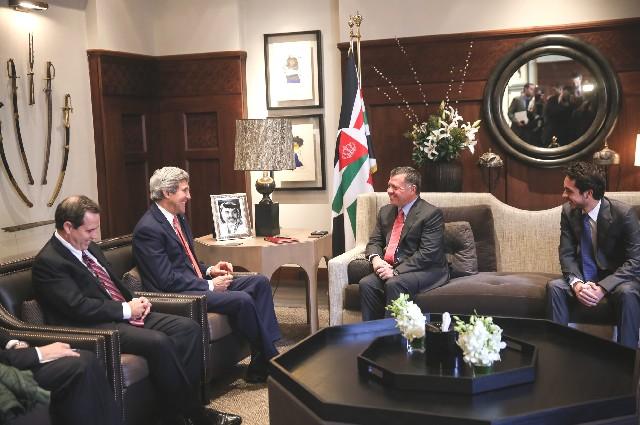You are here
US bid for Mideast peace not ‘quixotic’
By Agencies - Feb 01,2014 - Last updated at Feb 01,2014

MUNICH/OCCUPIED JERUSALEM — US Secretary of State John Kerry said on Saturday that he remains hopeful that the Obama administration’s effort to broker a peace deal between Israelis and Palestinians can succeed, Reuters news agency reported.
The United States hopes to complete a “framework” accord in coming weeks and will then try to negotiate a final peace deal by the end of 2014, a US official said last week, according to a participant in a briefing with American Jewish leaders.
“I am hopeful and we will keep working on it,” Kerry, who despite widespread scepticism is leading the US effort to push the two sides towards a deal, said during remarks at the Munich security conference.
“I believe in the possibility or I wouldn’t pursue this,” he said. “I don’t think we’re being quixotic ... We’re working hard because the consequences of failure are unacceptable.”
US envoy Martin Indyk said the framework would address core issues in the conflict, including borders, security, refugees and Jewish settlements, a participant in the briefing said.
Israeli Prime Minister Benjamin Netanyahu’s coalition, which includes pro-settler parties, has already shown signs of strain over talks on Palestinian statehood.
Jordan Valley
The UN humanitarian coordinator for the Palestinian territories Friday criticised Israel’s demolition of 36 homes in the Jordan Valley and urged a halt to such actions in the West Bank, according to Agence France-Presse.
Hundreds of activists, meanwhile, staged an overnight demonstration in the Jordan Valley region.
The moves came as fresh opinion poll evidence showed that faith in the Middle East peace process has largely evaporated among both Israelis and Palestinians.
The demolitions in the Jordan Valley community of Ain Al Hilweh on Thursday displaced 66 people, including 36 children, James Rawley said in a statement.
“I am deeply concerned about the ongoing displacement and dispossession of Palestinians... along the Jordan Valley where the number of structures demolished more than doubled in the last year,” he said.
“This activity not only deprives Palestinians of access to shelter and basic services, it also runs counter to international law.”
His office said more than 1,000 people had been displaced last year in the West Bank and annexed East Jerusalem by demolitions on the grounds that homes had been built without Israeli permits, “which are virtually impossible to obtain”.
On Friday, around 300 Palestinians together with Israeli and foreign activists set up camp in abandoned houses near Jericho in the West Bank to protest against Israel’s refusal to pull out of the Jordan Valley in case of a peace deal, an AFP photographer said.
The demonstrators in Ain Hijleh village were equipped with generators and said they planned to spend the night in around a dozen of the houses, as Israeli troops and police kept watch from a distance.
They held a banner reading: “No peace with settlements.”
Their action — dubbed “Melh Al Ard” (salt of the earth) — aimed “to revive an old Palestinian Canaanite village in the Jordan Valley”, to counter any Israeli annexation plans, the activists said in a statement.
They condemned Jewish settlement construction in the West Bank and the Israeli-Palestinian peace process brokered by Kerry.
His efforts would “establish a disfigured Palestinian state and recognises the Israeli entity as a Jewish state”, they said.
Such a state would put Arab Israelis at risk of deportation at any time, the activists said.
Faith in the Middle East peace process has largely evaporated among Israelis and Palestinians in the two decades since the Oslo accords and a famous White House lawn handshake, a new poll found Friday.
According to the Zogby Research Services poll, neither side has much confidence in the new push for peace being led by Kerry, which the pollsters believe is proving a hard sell.
Although two decades have elapsed since then Palestinian leader Yasser Arafat and Israeli Prime Minister Yitzhak Rabin shook hands watched by then US leader Bill Clinton, “it is clear several deep differences exist” plaguing the atmosphere between the two sides.
“Twenty years later only 18 per cent of Palestinians and 19 per cent of Israelis view Oslo as a positive development in the history of their relationship,” the poll said.
Both sides believe the other is not committed to peace.
And only around a third of people in each community sees a two-state solution as feasible, even though 74 per cent of Israelis and 47 per cent of Palestinians agree it is the desired outcome.
“From the results of this poll, it is clear that the past 20 years have taken a toll on the confidence both Palestinians and Israelis have in the peace process that began with the 1993 signing of the Oslo accords,” the poll said.
Kerry is trying to draw up a framework agreement which would set out the end game in the resumed negotiations and guide the talks going forward over the next few months.
Twenty years ago both Palestinians, some 61 per cent, and Israelis, some 54 per cent, said they “were hopeful” when the Oslo accords were signed, setting out a roadmap for the peace process.
The poll was carried out in the Middle East in August 2013 among 1,000 Israelis and Palestinians, just as Kerry persuaded the two sides to resume talks after a three-year hiatus.
Related Articles
US Secretary of State John Kerry’s nine-month effort to broker an Israeli-Palestinian peace deal formally collapsed last week, with no revival on the horizon because each side appears firmly entrenched in its positions.
US Secretary of State John Kerry and Palestinian President Mahmoud Abbas held “constructive” talks on the Middle East peace process, a US official said Thursday, as crunch decisions loom in the coming days.
His Majesty King Abdullah on Sunday held talks with US Secretary of State John Kerry that covered bilateral ties and the latest regional developments, with focus on the peace process and the Syrian crisis.















